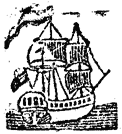 On 2 Sept 1775, Gen. George Washington wrote to Nathaniel Tracy, a merchant of Newburyport, from his headquarters at Cambridge:
On 2 Sept 1775, Gen. George Washington wrote to Nathaniel Tracy, a merchant of Newburyport, from his headquarters at Cambridge: You are hereby authorized and empowered to take up for the service of the said Colonies so many vessels as shall be necessary for the transporting a body of Troops to be detached from this Army on a secret expedition.Washington’s secretary, Col. Joseph Reed, then added:
Freight of such vessels to be paid in such manner and at such a rate as is herein endorsed; and in case of loss or damage to such vessels, or any of them, such loss or damage to be compensated by the publick, according to an estimation to be made before the said vessels proceed in the above service.
To prevent any dispute which may arise respecting the freight of the within vessels, it is agreed that Colonel [Azor] Orne, of Marblehead, with two other persons, to be nominated by him, fix the price, which shall be binding on both parties, and that the same gentlemen do appraise the vessels before they proceed.Orne had been a member of the Massachusetts Provincial Congress’s Committee of Safety and Supplies before the war, and knew the Essex County maritime community well.
The “secret expedition” Washington wrote about was Col. Benedict Arnold’s part of the American attack on Canada. Volunteers from the army around Boston were to march to Newburyport, board the ships that Tracy had provided, and travel by water along the coast and up the Kennebec River in Maine.
One ironic note about those letters from Washington and Reed: In 1781, Tracy bought the Cambridge house where they were written. It’s now Longfellow National Historic Site.
Perhaps ironically, we were discussing Nathaniel Tracy and the beginnings of Washington's Navy earlier today - at the Longfellow NHS. I just read this post and admire the coincidence!
ReplyDelete